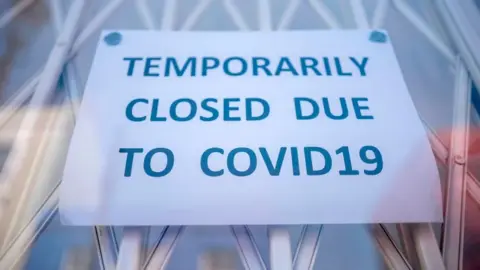Coronavirus: Park Avenue Hotel not reopening amid 'financial uncertainty'
 Google
GoogleThe Park Avenue Hotel in east Belfast will not reopen after what has been a "period of financial uncertainty", its owner has said.
The Beannchor Group said 45 members of staff are affected by the closure.
The company said the hotel had been left in an "unviable trading position" by the coronavirus pandemic.
Earlier on Thursday, Economy Minister Diane Dodds said another lockdown would be "devastating" for businesses in Northern Ireland.
She said the pandemic was both a "health crisis and economic crisis".
The Park Avenue Hotel's closure comes after the cancellation of large number of bookings, according to the Beannchor Group.
'Devastating impact on tourism sector'
In a post on Facebook, the hotel thanked customers and staff "who came through the doors over the last 60 years".
The Beannchor Group has the Merchant Hotel and Bullitt Hotel in Belfast city centre in its portfolio.
 Getty Images
Getty ImagesIt said: "Despite making a number of significant changes to hotel operations prior to Covid-19 the recent devastating impact on the tourism industry has been too great to continue a viable hotel in this location."
It said it was gravely disappointed by the situation and the impact on staff.
Earlier this year a proposal was submitted to Belfast City Council for the residential development of the site.
The planning application was part of a review of the hotel and an assessment of alternative uses for the site.
The Beannchor Group said the plan was to take forward that application for the possible development of new homes on the land.
"The hotel closure highlights that it is no longer sustainable for the property to continue as a hotel asset.
"It is therefore important that alternative uses are explored for the site."
'Can't shut economy down'
On Wednesday the Department for the Economy's top civil servant Mike Brennan outlined the level of the economic crisis brought on by the pandemic.
He warned the full effect of the crisis has not yet begun.
He said almost 330,000 workers in Northern Ireland are receiving some sort of income support from London and once those schemes end unemployment could hit 100,000 by the end of the year.
 Pacemaker
PacemakerMrs Dodds said on Thursday that "you cannot shut the economy down" and that she expected it to be "reassembled in exactly the same way with exactly the same levels of output".
"I have never sugar-coated this situation - just as we need to look after our health, we need to look after our economic health.
"We need to face the fact there will be difficult days ahead."
But she said the situation was "not all doom and gloom", adding that some sectors have reopened successfully and that can be continued if the public sticks to the health guidelines.
Mrs Dodds added that recovery in sectors such as tourism, hospitality and aerospace would take longer and those would "need a longer tail of support than others who have been opened throughout and are in recovery" already.
'False sense of security'
Gareth Hetherington, the director of Ulster University's Economic Policy Centre, described the suggested figure of 100,000 people unemployed by the end of this year as a "conservative estimate".
He said the talk of a rebound in the retail sector could lead to the risk of a "false sense of security".
 Getty Images
Getty Images"The 100,000 is not a worst-case scenario," he said.
Mr Hetherington added that much the recovery had been supported by government initiatives such as the furlough scheme and that "isn't a sound basis on which to make a determination of the strength of economic recovery".
On Wednesday, pubs and theatres hoping for the green light to reopen next week were told the move will not go ahead.
An indicative date of 1 September had been set but an increase in coronavirus cases means the Northern Ireland Executive has put that on hold.
Colin Neill of the trade body Hospitality Ulster said it was "catastrophic news" for the industry.
He called on the executive to announce immediate financial support for publicans or "thousands of jobs will be lost along with a vital part of the hospitality sector".
